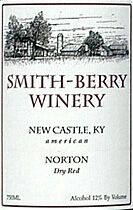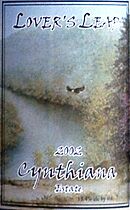|
Norton hears a what?
Let's celebrate Christmas Eve with another of our occasional trips down a less-traveled byway in the world of wine. Even more naturally "American" than Zinfandel and just about as mysterious in its vinous history, the Norton variety, also known as Cynthiana, has a virtual cult following among the fans of small-farm wineries in the Midwest and Upper South ... and it is just about unknown everywhere else. Even its fanciers often mistakenly categorize Norton with the French-American hybrid varieties that form the mainstay of many producers in the Eastern U.S. and Canada, but it's neither a hybrid nor a cross. It's a full-blooded American native grape ... but not the much-maligned native vitis labrusca. It's an entirely different species, vitis aestivalis ("summer grape"), first discovered in the 1830s in Virginia, where it grew wild on the margins between forests and fields. Originally called "Virginia Seedling," the small blue-black grape was enthusiastically embraced by wine makers in the region, who were delighted to find a grape with the winter-hardiness of native varieties but without the overwhelming "grapey" aromas that dominate the old-fashioned country-style Concord and kosher wines made from the more commonplace labrusca. Now known variably as Norton and Cynthiana - it's the identical grape under either name - it's not a particularly easy variety to grow and doesn't bear a heavy crop of fruit, considerations that have probably limited its commercial potential outside its native region. But from Arkansas (where it's usually called Cynthiana) and Missouri (where it's most often called Norton), east to Virginia and North Carolina and west to Nebraska and Iowa, Norton attracts loyal followers who have discovered its delicious secret: It is one of the very few native or hybrid grapes that can produce a quality table wine that closely resembles the style and that can frequently match the quality of vitis vinifera, the European family of wine grapes (Cabernet, Chardonnay, Merlot and cousins) that make virtually all the world's best wine. A very few Nortons come from producers large enough to supply a limited market outside their home territory: Horton in Virginia (which produces the delightfully alliterative Horton Norton) and Stone Hill in historic Hermann, Mo. (which has probably won more awards in national competition than any other Norton) enjoy at least slight national recognition. But most Norton and Cynthiana can only be found at the winery tasting rooms and local retailers nearby. With apologies for putting a temptation before you that most of you won't be able to satisfy without a journey to the Bluegrass State, here are my reports on two very good Norton/Cynthiana wines made by small producers in Kentucky. Smith-Berry Winery is in New Castle, Ky., just off I-71 in the scenic rolling farm country just south of the Ohio between Louisville and Cincinnati. One of the state's newest wineries, it is a partnership between farmer/winemaker Chuck Smith and farmer/author/environmentalist Wendell Berry. Although vinified in Kentucky, the wine is made from 2001 vintage Norton grapes trucked in from Arkansas. Accordingly, under the strange U.S. wine laws, it must bear only the appellation "American" and may not show a vintage on the label. Smith-Berry wines are available at the winery and at a few Louisville restaurants. Lover's Leap Vineyard & Winery is near Lawrenceburg, Ky., south of I-64 between Louisville and Frankfort, the state capital. Jerry and Ann Holder have been growing grapes on their 24-acre property since 1994 and began producing wine commercially in the past year or two. Their 2002 Norton betrays unusual heat and drought that year in Central Kentucky, which dehydrated 20 percent of the grapes before harvest, resulting in an intensely concentrated, jammy wine. Lover's Leap wines are sold at the winery and select Kentucky retail shops.
HAVE YOU TASTED NORTON/CYNTHIANA? If you prefer to comment privately, feel free to send me E-mail at wine@wineloverspage.com. I'm sorry that the overwhelming amount of mail I receive makes it tough to respond personally every time, but I do try to get back to as many as I can.  Smith-Berry Winery American Norton ($15)
Smith-Berry Winery American Norton ($15)
This memorable Norton is among the better Eastern U.S. reds I've tried. Fruity and balanced with good, almost Zinfandel-like mixed-berry flavors, it shows both red and black fruits on the nose and palate and an odd but intriguing flavor profile, soft on first taste but firming up with a core of tart acidity in the finish. (Tasted three times between Sept. 3 and Sept. 23, 2003) FOOD MATCH: Tasted two times in restaurant settings, where it worked well with a poussin chicken in a dense, smoky Provencal-style sauce fashioned from local heirloom tomatoes (at 610 Magnolia in Louisville), and with a pork chop with figs and a fava bean and root vegetable brunoise (at Nu in Santa Barbara). VALUE: Competitive with international wines at this mid-teens price point. WHEN TO DRINK: Good now, but the winery recommends two years cellar time.
WEB LINK: You'll find the Smith-Berry Website here:  Lover's Leap 2002 Estate Cynthiana ($13)
Lover's Leap 2002 Estate Cynthiana ($13)
This is a very dark ruby-colored wine with reddish-purple glints. Its aroma is exceptionally ripe, concentrated and "jammy," candied fruit and spice, on the grapey side. It's more balanced in flavor, good red-berry fruit shaped by snappy acidity. Its robust body and concentration are reminiscent of a big Zin, but it has a distinct personality all its own. (Dec. 20, 2003) FOOD MATCH: Fine with a hearty dish of leftover pork tossed with new potatoes and sharp white Cheddar. VALUE: An intriguing, impressive wine at this price. WHEN TO DRINK: Ripe and approachable now; not enough information on Norton/Cynthiana to predict aging potential.
WEB LINK: The label lists a Web address, but there's no Website there yet. Administrivia To subscribe or unsubscribe from The 30 Second Wine Advisor, change your E-mail address, or for any other administrative matters, please use the individualized hotlink found at the end of your E-mail edition. If this is not practical, contact me by E-mail at wine@wineloverspage.com, including the exact E-mail address that you used when you subscribed, so I can find your record. We do not use our E-mail list for any other purpose and will never give or sell your name or E-mail address to anyone. I welcome feedback, suggestions, and ideas for future columns. To contact me, please send E-mail to wine@wineloverspage.com All the wine-tasting reports posted here are consumer-oriented. In order to maintain objectivity and avoid conflicts of interest, I purchase all the wines I rate at my own expense in retail stores and accept no samples, gifts or other gratuities from the wine industry.
Wednesday, Dec. 24, 2003 |




